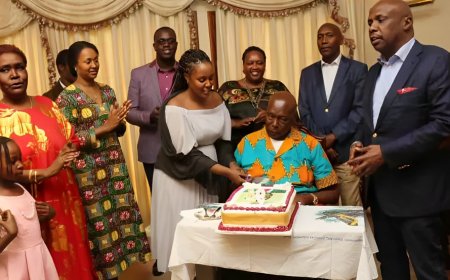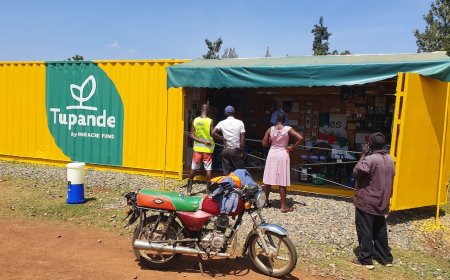Nursing Council of Kenya Registration, Services, and License Renewal 2024
Explore the Nursing Council of Kenya's processes for nurse registration, license renewal, and services. A must-read for every nursing professional in Kenya.

Welcome to our comprehensive guide on the Nursing Council of Kenya (NCK), a pivotal institution in the nursing profession in Kenya. The NCK is essential in regulating and maintaining the country's nursing and midwifery standards. This Council is not just a regulatory body; it is the cornerstone that ensures the nursing profession upholds its integrity, professionalism, and commitment to healthcare excellence.
In this blog post, we delve into the intricacies of the NCK, particularly focusing on the registration, services, and license renewal processes. These aspects are crucial for every practicing nurse in Kenya, as they form the legal framework that grants the authority to practice nursing within the country. The registration and licensing process is a testament to the rigorous standards set by the NCK, designed to ensure that only qualified individuals are entrusted with the noble task of nursing.
We will explore the different pathways to registration for nurses trained both within Kenya and abroad, highlighting the unique requirements and steps involved in each process. Furthermore, we will discuss the renewal of nursing licenses, a critical procedure that ensures nurses continue to meet the evolving standards of the profession. Alongside these, the array of services offered by the NCK will be outlined, showcasing how the Council supports continuous professional development and adherence to ethical standards.
READ ALSO: Lecturers' Salaries in Kenya 2024: Variations, Influences, and Additional Considerations
NCK Registration Process for Nurses Trained in Kenya
The journey to becoming a licensed nurse in Kenya is marked by a series of meticulous steps overseen by the Nursing Council of Kenya (NCK). For nurses trained within the country, the registration process is a critical gateway to professional practice, underscoring the NCK's commitment to maintaining high standards in the nursing field.
Step-by-Step Registration Procedure
- Passing the Licensure Examination: The first step towards registration is successfully passing the Council's national licensure examination. This exam is a rigorous assessment of candidates' knowledge and skills, ensuring they meet the required competency standards for nursing practice in Kenya. Upon passing this examination, candidates embark on the official registration process.
- Online Application for Registration and Licensing: Successful candidates must submit an online application for registration and licensing following the release of the examination results. This online process is designed to be user-friendly and efficient, marking the transition from a nursing student to a potential healthcare practitioner.
- Receiving the Practice License and Registration Certificate: Nurses are issued a practice license and registration certificate once the registration and licensing are completed. The practice license is usually provided within a period of 72 hours, while the registration certificate takes about four weeks. These documents are not just formalities; they symbolize the nurse's authority and readiness to serve in the healthcare sector.
Specific Requirements for Different BScN Graduates
The NCK categorizes Bachelor of Science in Nursing (BScN) graduates into four distinct groups, each with its specific registration requirements:
- KRCHN (B) to BScN Graduates: These graduates can directly apply for registration without needing an internship. This pathway acknowledges their prior experience and education.
- RN/M to BScN Graduates: They must undergo 15 weeks of self-sponsored internship in community health nursing. This experience is vital in bridging any gaps between their previous training and the BScN level.
- RN to BScN Graduates: This group must complete 27 weeks of self-sponsored midwifery and community health nursing internship. The extended period reflects the comprehensive nature of the skills and knowledge they need to acquire.
- Basic BScN Graduates: They are expected to complete a 1-year internship, which can be government-sponsored or self-sponsored. This extensive internship is crucial in preparing them for the multifaceted demands of nursing.
By tailoring the registration process to the specific educational background of each graduate, the NCK ensures that all nurses, regardless of their training pathway, are adequately prepared for the responsibilities that lie ahead in their professional journey. Carefully considering different educational backgrounds underscores the NCK's dedication to fostering a competent and versatile nursing workforce.
NCK Registration Process for Nurses Trained Outside Kenya
Navigating the registration process with the Nursing Council of Kenya (NCK) poses a unique set of challenges and requirements for nurses trained outside Kenya (NTOK). This process is vital in ensuring that international standards align with Kenya's stringent healthcare benchmarks, safeguarding the quality of nursing care provided in the country.
Essential Steps for NTOK Registration
- Initial Contact and Eligibility Confirmation: Nurses trained outside Kenya must first establish contact with the NCK through their website or direct communication channels such as email or phone. This initial step is crucial for confirming eligibility and understanding the specific requirements set by the NCK.
- Qualification Verification: The NCK thoroughly verifies the applicant's qualifications with the relevant training school and nursing/midwifery board from their respective country. This step ensures that the educational standards and competencies attained by the nurse align with those required in Kenya.
- Oral Interview and Licensure Examination: Successful applicants are invited for an oral interview by the Registration and Licensing Committee, followed by a written licensure examination. The oral interview assesses the applicant's understanding of nursing practices, while the written exam tests their theoretical knowledge and practical skills.
- Clinical Placement: Depending on the outcome of the interview and examination, NTOK nurses may be required to undergo a clinical placement lasting up to 24 weeks. This placement is integral to acquainting nurses with the Kenyan healthcare system and its specific practices and protocols.
- Final Registration and Licensing: Upon successfully completing the clinical placement, nurses must submit an online application for registration and licensing. The NCK reviews these applications, and approved nurses/midwives receive a practice license and registration certificate within a set timeframe, typically 72 hours for the license and four weeks for the certificate.
Upholding Global Standards
This comprehensive process serves multiple purposes. It ensures that NTOK nurses have the necessary skills and knowledge that align with Kenyan healthcare standards. Moreover, it fosters a diverse nursing workforce in Kenya, enriched by global experiences and perspectives. The NCK, through these stringent procedures, ensures that every nurse, regardless of their country of training, delivers care that meets the high standards expected in Kenya.
NCK License Registration and Renewal
The Nursing Council of Kenya (NCK) oversees the initial registration of nurses and manages the critical process of license renewal. This process is essential for ensuring that nurses maintain high standards of professional practice and stay updated with the evolving healthcare landscape.
Licensing for Nurses Trained in Kenya
- Mandatory Licensing Examination: For nurses trained in Kenya, obtaining a license commences with passing the NCK's national licensing examination. This rigorous assessment verifies that the candidates possess the requisite knowledge and skills to practice nursing safely and effectively in Kenya.
- Application for License: Successful candidates must apply for their license within 30 days after the examination results are released. This step is crucial as it transitions the individual from a nursing graduate to a legally recognized healthcare practitioner.
- Issuance of Registration Certificate and Practice License: The NCK issues a registration certificate and a practising license following a successful application. These documents are a legal requirement and a mark of professional recognition and credibility in nursing.
Renewal of Nursing License
- Annual Renewal Requirement: The NCK requires that the practising license be renewed annually. This renewal is contingent upon attaining 20 Continuing Professional Development (CPD) points earned through various courses and activities that enhance a nurse's skills and knowledge over their career.
- Online Renewal Process: The renewal can be done online, where nurses log into the NCK portal, follow the specified steps, and submit the necessary documents. This process includes paying a non-refundable renewal fee and providing evidence of the completed CPD hours.
- Waiting Period and License Issuance: After submission, there's a waiting period of approximately 30 days for NCK to review the applications. Once approved, a new certificate is issued, and nurses are notified to collect their renewed practising licenses, ensuring they remain compliant with the legal and professional standards set by the NCK.
Ensuring Ongoing Competence and Compliance
The renewal process is pivotal in maintaining the quality of nursing care in Kenya. By mandating the completion of CPD activities, the NCK ensures that nurses continually update their skills and knowledge, adapting to new healthcare challenges and technologies. This ongoing learning and development are crucial for maintaining the highest patient care and professional practice standards.
Additional Services Offered by NCK
In addition to its primary roles in registration and licensing, the Nursing Council of Kenya (NCK) offers services that cater to the diverse needs of both nursing students and practitioners. These services support the professional growth and regulatory compliance of nurses in Kenya.
Services for Practitioners
- Retention/NCK License Renewal: One of the key services provided by the NCK is the renewal of the NCK practicing license. This process is crucial for practitioners to continue legally practicing nursing in Kenya. It involves earning Continuing Professional Development (CPD) points and submitting an online application through the NCK portal.
- NCK Private Practice License: The NCK facilitates the application for a private practice license for nurses who wish to establish private clinics. This service is essential for ensuring that private nursing practices meet the regulatory and professional standards set by the Council.
- Out-migration and Verification of Documents: The NCK assists nurses who plan to practice abroad by providing verification of documents and issuing letters of Good Standing. This service is crucial for nurses seeking international opportunities, as it validates their qualifications and professional status.
- Free Online CPD Courses: The NCK offers free online CPD courses through the NCK-WCEA platform. These courses are vital for nurses to update their knowledge and skills, ensuring they remain competent and compliant with the evolving healthcare sector.
Services for Students
- NCK Online Licensing Examination Application: Nursing students can apply for the NCK licensing examination through the NCK portal. This service streamlines the examination application process, making it more accessible and efficient for students.
- Internship Applications for BScN Students: The portal also facilitates internship applications for Bachelor of Science in Nursing (BScN) students. This service is vital for ensuring that students complete their required clinical training in approved healthcare facilities.
- Viewing Exam Results and Downloading Exam Cards: Students can view their online exam results and download their NCK exam cards through the portal, providing easy access to essential examination information.
Enhancing Professional Development and Regulatory Compliance
The range of services offered by the NCK is designed to support the professional journey of nurses from their student days to advanced career stages. By providing these comprehensive services, the NCK ensures regulatory compliance and fosters a culture of continuous learning and professional excellence among nurses in Kenya.
READ ALSO: Top 20 International Schools in Kenya and Their Fees Structure For 2024
FAQs
How does a nurse trained in Kenya register with the NCK?
- Nurses trained in Kenya must pass the NCK licensure examination and then apply online for registration and licensing. The process involves submitting required documents and varies slightly depending on the nurse's educational background.
What are the steps for nurses trained outside Kenya to register with the NCK?
- Nurses trained outside Kenya must prove their competency as per Kenyan standards and undergo qualification verification, an oral interview, a written exam, and possibly a clinical placement before registering.
How often do I need to renew my NCK practising license, and what are the requirements?
- The NCK practicing license needs to be renewed annually. Requirements include earning 20 CPD points, paying the renewal fee, and submitting an online application with necessary documents.
Can I apply for a private practice license through the NCK?
- Yes, the NCK offers services for applying for a private practice license, essential for setting up private nursing clinics in compliance with NCK standards.
Are there online resources for continuous professional development?
- The NCK provides free online CPD courses through the NCK-WCEA platform, aiding nurses in updating their skills and knowledge.
Conclusion
In conclusion, the Nursing Council of Kenya serves as the linchpin in the professional journey of every nurse in Kenya. From the meticulous registration process for both locally and internationally trained nurses to the annual license renewal, the NCK upholds the highest standards of nursing practice. Its array of services, including CPD courses and private practice licensing, demonstrates a commitment to fostering continuous learning and upholding professional ethics. As the nursing landscape evolves, the NCK remains a steadfast guardian of quality healthcare delivery, ensuring that every nurse in Kenya is equipped, compliant, and capable of providing exceptional care.












































































